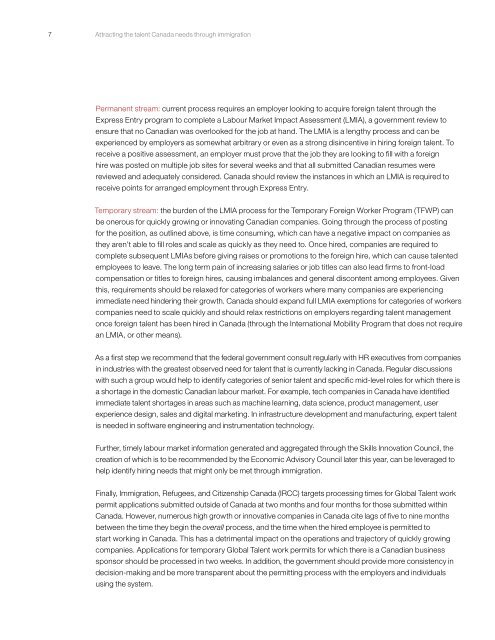ATTRACTING THE TALENT CANADA NEEDS THROUGH IMMIGRATION
ZubH3083F47
ZubH3083F47
You also want an ePaper? Increase the reach of your titles
YUMPU automatically turns print PDFs into web optimized ePapers that Google loves.
7 Attracting the talent Canada needs through immigration<br />
Permanent stream: current process requires an employer looking to acquire foreign talent through the<br />
Express Entry program to complete a Labour Market Impact Assessment (LMIA), a government review to<br />
ensure that no Canadian was overlooked for the job at hand. The LMIA is a lengthy process and can be<br />
experienced by employers as somewhat arbitrary or even as a strong disincentive in hiring foreign talent. To<br />
receive a positive assessment, an employer must prove that the job they are looking to fill with a foreign<br />
hire was posted on multiple job sites for several weeks and that all submitted Canadian resumes were<br />
reviewed and adequately considered. Canada should review the instances in which an LMIA is required to<br />
receive points for arranged employment through Express Entry.<br />
Temporary stream: the burden of the LMIA process for the Temporary Foreign Worker Program (TFWP) can<br />
be onerous for quickly growing or innovating Canadian companies. Going through the process of posting<br />
for the position, as outlined above, is time consuming, which can have a negative impact on companies as<br />
they aren’t able to fill roles and scale as quickly as they need to. Once hired, companies are required to<br />
complete subsequent LMIAs before giving raises or promotions to the foreign hire, which can cause talented<br />
employees to leave. The long term pain of increasing salaries or job titles can also lead firms to front-load<br />
compensation or titles to foreign hires, causing imbalances and general discontent among employees. Given<br />
this, requirements should be relaxed for categories of workers where many companies are experiencing<br />
immediate need hindering their growth. Canada should expand full LMIA exemptions for categories of workers<br />
companies need to scale quickly and should relax restrictions on employers regarding talent management<br />
once foreign talent has been hired in Canada (through the International Mobility Program that does not require<br />
an LMIA, or other means).<br />
As a first step we recommend that the federal government consult regularly with HR executives from companies<br />
in industries with the greatest observed need for talent that is currently lacking in Canada. Regular discussions<br />
with such a group would help to identify categories of senior talent and specific mid-level roles for which there is<br />
a shortage in the domestic Canadian labour market. For example, tech companies in Canada have identified<br />
immediate talent shortages in areas such as machine learning, data science, product management, user<br />
experience design, sales and digital marketing. In infrastructure development and manufacturing, expert talent<br />
is needed in software engineering and instrumentation technology.<br />
Further, timely labour market information generated and aggregated through the Skills Innovation Council, the<br />
creation of which is to be recommended by the Economic Advisory Council later this year, can be leveraged to<br />
help identify hiring needs that might only be met through immigration.<br />
Finally, Immigration, Refugees, and Citizenship Canada (IRCC) targets processing times for Global Talent work<br />
permit applications submitted outside of Canada at two months and four months for those submitted within<br />
Canada. However, numerous high growth or innovative companies in Canada cite lags of five to nine months<br />
between the time they begin the overall process, and the time when the hired employee is permitted to<br />
start working in Canada. This has a detrimental impact on the operations and trajectory of quickly growing<br />
companies. Applications for temporary Global Talent work permits for which there is a Canadian business<br />
sponsor should be processed in two weeks. In addition, the government should provide more consistency in<br />
decision-making and be more transparent about the permitting process with the employers and individuals<br />
using the system.




